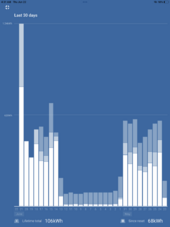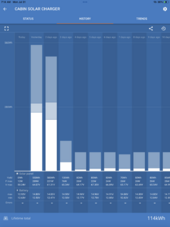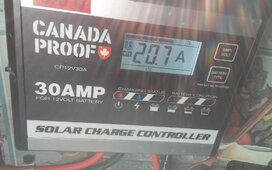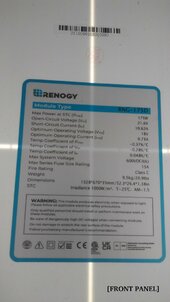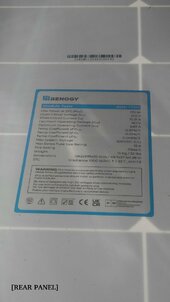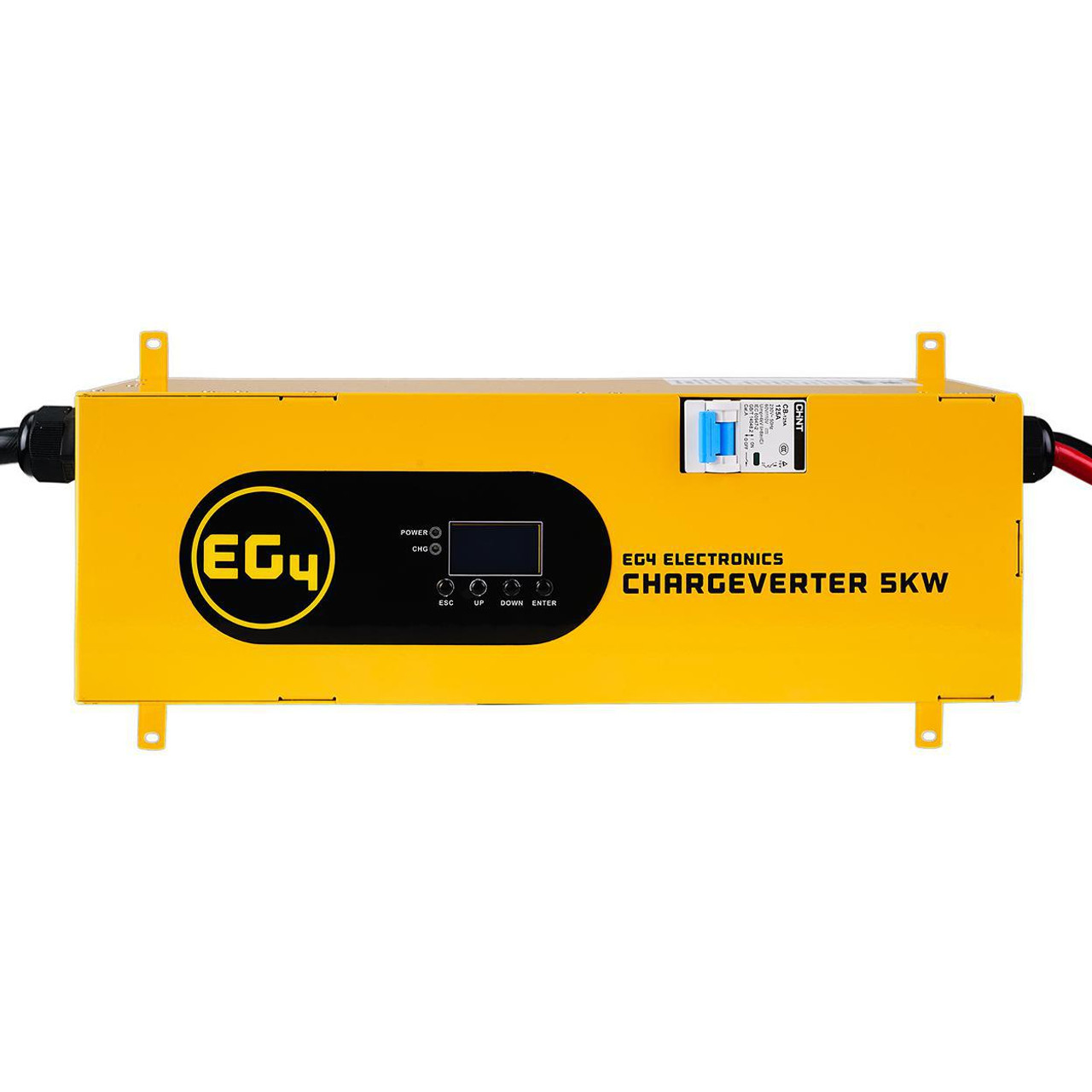RV8R
Solar Enthusiast
Hi everyone and thanks again for your help!
You make me redo my homework.
The first year, I’ll have access to the AC from where I’ll do my build so I only need DC for led, diesel heater, water pump some computer fans… if I don’t miss anything and for that I can go with a Li Time 12V or 12.8V 100Ah and a fuse box and keep the cost around CAD 500$.
And in a year I'll build a second system separate from this.
So I have one more year for planning my electrical system!
My van will be isolate and heat all the winter with a diesel heater.
Cooking and fridge will be on propane.
I don't want anything else than LiFePO4 Lithium Battery.
I know that my need will be around 2KWh/day and I want around 5KWh to 6KWh in battery.
So my second system will need to have 4KWh to 5KWh.
I keep the door open to go 12V, 24V, 48V!
***The goal of my post is to learn what do I need in my system to:***
What do I need to charge with an EV public charger (7.2kW)?
What do I need to charge with a car alternator?
What do I need to plug in a camping site?
What do I need to plug in a 120V AC house?
I have see on YouTube some people who have use the EV public station to charge the battery in their VR and that was working.
The best info I have found is from this video and it's look like it's working well with his 24V 300Ah battery:
From what I understand so far is that the terminal has a voltage of 240V, a useful power of 7.2KW with a J1772 connector.
With a 240V to 12V/24V charger, a J1772 to NEMA adapter, it is possible to charge 12V and 24V batteries.
I'm here to learn more details about how and with what I'll able to do it and have more user feedback.
It'a 4 minutes video, please take the time to watch it before answering something about EV charger.
---------------------------------------------------------------------------------------------------------------------------------------------------------------
I also have a question for my fellow Canadians who have solar panels installed horizontally on the roof of their vehicle!
I want to know how much cost effective it’s and what performance it give you during summer and winter in Canada?
If I choose to add solar to my build, it’ll probably be a commercial panel between 400W to 550W and 60 or 66 cells from what I know about solar for now.
Thanks!
---------------------------------------------------------------------------------------------------------------------------------------------------------------
Thanks for your reply, nothing again nobody, but come on guys, try to keep my post clean as possible, and it probably already have a lot of post where you can talk about the rest that I'm not here to learn!
Look at the first post in page 2 to see what I'm looking for now! Thanks!
Pat
Hi @JohnD0h
So This post will be long.
First, I am going to give you more grace than I generally do on forums, as I understand english is not your first language & that can be difficult & things can be lost in translation. I would be lost if I had to communicate in Francais. Un peu de francais, but not much.
So where to Start ,,, EV Charging ,,, I have not done it, so not much help here, but I do have a few comments about the videos you posted;
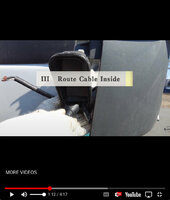
Sprinter Guy Video; This can be an issue on YouTube. IMO, I do not think many DIYers would catch this & tge risk is possibly low ,,, but ,,, if you do not know what this DIYer did here, he compromised the oneway “exhaust only” of the driver’s side rear interior air relief vent. Sticking a cord thru that device can create an inlet for tailpipe exhaust fumes & especially if the rooftop fan is exhausting interior air. Possible yes, unsafe maybe, probable
Careful who you “follow” out there.
This is not impressive charge rates for me for EV charging;
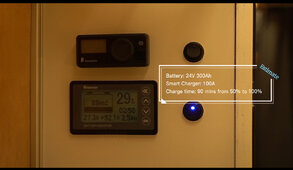
Next Up ,,, Single Handedly Saving the World with his Diesel Guy;

Ok, I lasted to 4:31. Maybe I bailed early, but the 1/4 of the video I watched was just ego back-patting & verbal diarrhea about how great he is being charging up his diesel van with EV chargers sometimes for free. Sorry, but I will not waste my time ( again ) watching such dribble.
If you want me to watch a video now, please post the timeframe in & the specific item you are asking about, otherwise I am too busy.
On to your questions;

7.2 KW EV ,,, I don’t know, but is that something you want in a T-4 ?
Car Charger; in short a “Great Alternator” & a “Good DC2DC” like a Kisae. 30amp 50amp 100amp now ,,, they are dual “alternator & solar” chargers
Campsite;
This ( dual or single );

& one of these if the Campsite has 30 amp only ( Caveat - careful on selecting these as you want an adapter that plugs into the campsite pedestal & then into a 15amp extension cord heavy gauge ). I use a 30amp shore inlet on my van, so I have gone another method & this suggestion has not been vetted by me );
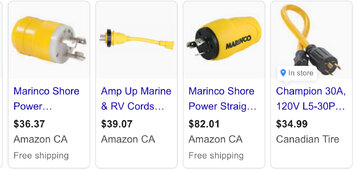
For 120Vac House ,,, See above NOCO.
If you want to see my 30amp Inlet on my van go here;
RV8Rs New Build - TETRIS
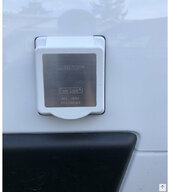
Onto your “Load Calculations” or “Energy Audit”;
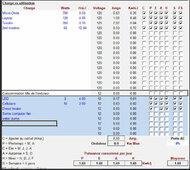
I was having difficulty deciphering this, however, now that I have a second look at it, I understand the word in French for days and that the “J” is not for “Joules”. When I first looked at this, I was very confused with the. “J”.
So what is your total KWh use per day ?
FYI, here are a couple of examples I did for DIY van builders to help them understand their needs;
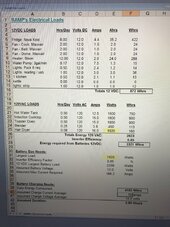
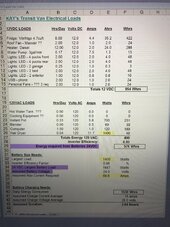
The last one was more complicated & incomplete for information input.
The next comment is for “clarity only” & I think you know this;
A Watt “W” is “Power”
A watt hour “Wh” is “Energy”
If you calculate your energy needs in “Wh” rather than amp hours “Ah”, then we can disregard the battery or system voltage calculations. It is the purist way to calculate.
On a “Final Note”;
This Victron “Wire Unlimited” pdf / manual teaches the very basic to help DIYers understand & learn. If you know everything in it then bypass it ,,, but if not ,,, help yourself out by reading it ,,, I highly recommend it & it is free self paced learning;

Ok; I’m down from my soapbox now
Last edited:



